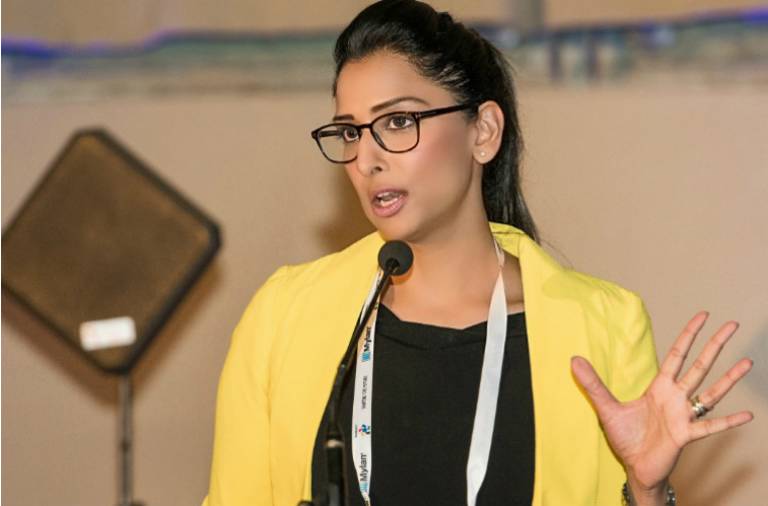My route to Principal Teaching Fellow: Nadia Bukhari
Nadia Bukhari, UCL School of Pharmacy, on training and educating the next generation of pharmacists

4 October 2018
Nadia Bukhari has recently been promoted to Principal Teaching Fellow in Pharmacy Practice at UCL School of Pharmacy, where she leads the final year pharmacy practice module. She has also recently taken on the role of head of alumni relations for the school.
Nadia began her professional career as a community pharmacist as a pharmacy manager in London. She then moved on to work for Bart’s and the London NHS Trust, London as a clinical pharmacist in surgery.
In 2015, Nadia was awarded Fellow of the Royal Pharmaceutical Society in recognition of her distinguished career. She is the youngest woman and youngest Asian to be awarded this accolade.
You’ve just been promoted to Principal Teaching Fellow. What is your role?
It’s a very demanding and challenging role; most certainly keeps me out of trouble! I am module lead for our final year, Masters level, pharmacy practice course (PHAY M101), I deliver the 'Professional Leadership & Professionalism' module and I teach pharmacy practice, law & ethics and therapeutics in all four years of the MPharm programme.
I am the co-ordinator and advisor at the School of Pharmacy for the joint pharmacy and medical school inter-professional education activity.
And I am School lead for pre-registration – the year of supervised practice that all students must undertake in order to become registered pharmacists - providing a structured careers service for all undergraduates and maintaining strong links with prospective employers, stakeholders & the professional body.
Why is your role important?
Pharmacists are at the forefront of healthcare and are the experts in medicines.
As health care providers, we require specific skills and knowledge in order to provide high quality patient care.
My role predominately involves training and educating the next generation of pharmacists who will be contributing to improving the patient’s health and to keep the public healthy. So the focus is on getting them ready for their professional career, perhaps more so than many programmes at UCL.
As well as being a personal tutor, I organise and deliver careers sessions for all four years of students; develop and deliver revision sessions for alumni in their training year; act as a mentor to pharmacy undergraduates and newly qualified alumni
What are the challenges?
Working part time is a huge challenge in a senior role; the key is to be highly organised and have sound emotional intelligence so that you are fully aware of the expertise within the team and able to delegate appropriately.
What’s the best thing about your job?
This one is difficult to answer as there are so many things that I love about my job and working at UCL.
Firstly, and most importantly - the students. Professionally developing and educating students and junior pharmacists is a passion and is a great driver for me.
In addition, I love the diversity of my role – which includes teaching, research and advocacy of my professional globally – and, significantly, the flexibility it gives me to capitalise on opportunities.
What do you think of the new Academic Career Framework?
Initially I found it quite difficult to follow and therefore, made contact with the HR team at UCL.
The HR team were extremely helpful and offered additional guidance on the process. Once I got my head around some of the language, I started to map my activities and achievements to the framework. During this process, I appreciated its robustness as well as broadness and it gave me the confidence that I was ready for promotion.
My biggest piece of advice would be that it’s important to have a mentor/advisor; someone who has gone through the promotion process themselves.
They will be able to give advice around the procedure and the kind of activities one should engage in which would make a case for promotion stronger. I was unsuccessful first time round via our internal process using the older version of the framework. This made me even more determined to better my application.
I sought advice from seniors within my department who guided me on the type of activities I should be leading on. I found their advice invaluable and this made me better equipped for the promotion process.
What other achievements helped you to make a case for promotion?
I was nominated for the Provost’s Global Engagement Award and have been titled ‘UCL Global Pharmacy Ambassador’ for my global advocacy work. I was shortlisted for the Students’ Union ‘Outstanding Teaching Award’ in 2015 and gained Fellowship of the Higher Education Academy in 2011.
My research focuses on pharmacy and leadership and I am now in the sixth year of my PhD, publishing my work and speaking at International conferences regarding my research. I have authored eight titles with the Pharmaceutical Press and I am the Founder for the Registrations Assessment Questions series and the Pharmacy Registration Assessment Questions series at the Pharmaceutical Press, London.
My broader professional involvement in pharmacy and healthcare undoubtedly strengthens my teaching work at UCL. I am Chair and organiser for the Royal Pharmaceutical Society (RPS) national pre-registration training courses and was recently elected to the English Pharmacy Board at the RPS, the first Muslim woman to be on the Board. In addition, I was recently appointed as an associate Non-Executive Director for London North West NHS Trust and Director of Education for PharmAesthetics UK.
I am a trustee and ambassador for an education charity in Pakistan called Pakistan Alliance for Girls’ Education and actively promote gender equality in education but have also been working towards increasing the access to education for girls across Pakistan.
 Close
Close

